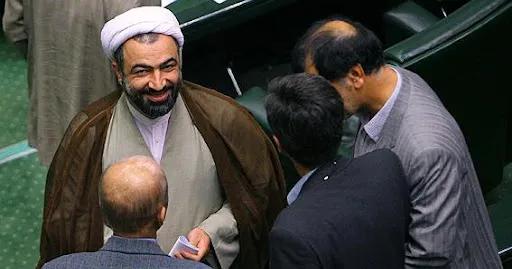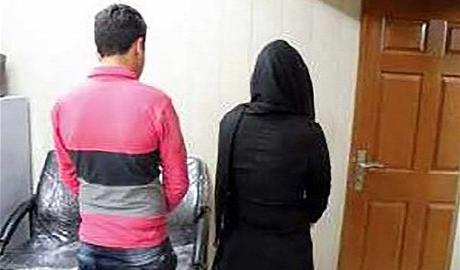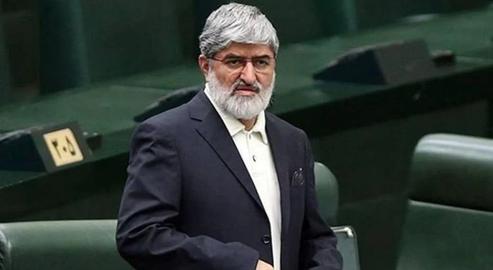“What do you think that minority who wave their headscarves in some streets are after? ... The only ‘freedom’ that they want is to sleep with somebody each night and behave like animals,” wrote Hamid Rasaee, a former member of the parliament, in response to protests that started with the September 16 death of Mahsa Amini in the hands of the morality police.
Statements such as this have attracted much attention in Iran in recent days. But this is not the first time that Islamic Republic officials claim that sexual pleasure or, as they put it, “moral corruption” and “prostitution, is the only goal of the opponents when they demand freedom.
Since the 1979 Islamic Revolution, Supreme Leader Ayatollah Ali Khomeini and other officials have repeatedly used these words against the opposition and especially against opponents of the forced hijab and other restrictions on women. They have even used them against other Islamic groups. In the 1980s, Tehran prosecutor Asadollah Lajevardi claimed that birth control pills had been found in the team houses belonging to the outlawed People’s Mojahedin Organization (MEK).
But things have changed and such words are not as effective as before. Personal choice and sexuality are no longer as taboo as they were in the past and, in some cases, they are not even considered charges.
Other hardliners have spoken the same way that Rasaee, including the thinker Hossein Kachooyan, who said that by “Woman, life, freedom”, one of the leading slogans of protestors, means “Woman, prostitution, lechery”.
And, in 2018, General Mohammad Reza Naghdi, a member of the Joint Staff of the Revolutionary Guards in charge of cultural affairs, called anti-forced hijab protesters, known as Revolution Street Women, “prostitutes”.
“They call the prostitutes who remove their hijab ‘opponents of forced hijab’ and even our media use the same term,” Naghdi said.
The Long Record of Smearing Defenders of Women’s Rights
Accusing protesters of sexual corruption has been one of the main tools of the Islamic Republic since its beginning and none of the opposition groups, not even Islamic ones, have been spared.
In the beginning, Ayatollah Ruhollah Khomeini, the founder of the Revolution, accused opponents of forced hijab and restrictions on women of wanting to return to the “nudity”, “moral corruption” and the “prostitution” that existed under the Shah. Later, however, these accusations were extended to opposition political or armed groups even though these groups had stringent rules about relations between the sexes.
Besides these public accusations, pressure to confess to sexual relations have also been used extensively to break the resistance of political prisoners and to pressure them into making forced confessions.
Khomeini repeatedly accused his political opponents that, by freedom, they meant Western-style freedom or, as he put it, “corruption and prostitution”. “They want our youth to be ‘free’. They want gambling houses to be freely open, liquor houses to be freely open, houses of pleasure to be freely open, heroin dens to be freely open, opium dens to be freely open…” he said in 1979.
“They saw freedom in other things, things that were all corrupt. They say freedom in women and men, naked in the sea and swimming together, in gathering together in houses of prostitution so that, as they themselves say, do whatever they want,” he said in another speech.
In the 1980s, government officials were focused on attacking “Western freedom” and claimed that supporters of women’s rights are supporters of the “sexual slavery” of women. One was the future president Ali Akbar Hashemi Rafsanjani. “Are women valued and free when the West puts women as mannequins behind shop windows to display underwear, bras and shorts? Were women created to display corsets as mannequins?” he said in a Friday Prayers sermon in 1984.
Birth Control Pills and Sodomy in Safe Houses
Accusations by the Islamic Republic were directed not only at supporters of civil rights but also at armed opposition groups, who had fought against the Shah. Tehran’s prosecutor Asadollah Lajevardi and other government officials repeatedly talked about finding birth control pills in the safe houses of the outlawed MEK. And Mojtaba Soltani, a pro-regime writer, claimed in his speeches that in these places, men had sexual relations with each other. Other Islamic Republic officials have repeated this claim in various forms, despite the fact that these guerilla groups had strict rules about relations between men and women in their team houses and, according to these rules, they could not even tell each other certain jokes.
In one case, for example, the left-wing Organization of Iranian People's Fedai Guerrillas executed one of its members, Abdollah Panjeh-Shahi, for having sexual relations with a fellow revolutionary, Edna Sabet.
Sexual Accusation Against Writers
The 1990s, sexual accusation against the opposition were extended to dissidents and writers as well and media outlets repeated these accusations one after another.
In 1996, Iranian state television started a biweekly program called Identity. The program's objective was said to be "confrontation with Western cultural invasion.” The series targeted a broad range of Iranian intellectuals (secular as well as religious modernists), archeologists, artists, scientists and national leaders. Defending the program against widespread criticisms, Ali Larijani, head of the Islamic Republic of Iran broadcasting (IRIB) said that the works of the writers and intellectuals who had been attacked in that program were all about “under underbelly”, meaning the genitals.
These accusations were also used in 1997 against the reformist Mohammad Khatami, who was running for president. The Hezbollah press published parts of a book that they considered “obscene” and had been cleared for publication when Khatami was the Minister of Culture and Islamic Guidance, so as to dissuade religious groups from voting for him.
And during his eight years of Khatami’s presidency, the Supreme Leader Ali Khamenei and his associates repeatedly claimed that a group of people wanted to promoted “promiscuity and prostitution” in the name of freedom.
“In the name of freedom – and we must really shed tears for the much-abused word ‘freedom’ – some people are promoting sinful acts, prostitution and promiscuity in society. The result is that people would view the regime with cynicism,” Khamenei said in 2000 in a meeting with the cabinet of Khatami after he was sworn in as president for a second term.
Beware of What Happened in Andalusia
In the years since the Islamic Republic was established, a certain story about Andalusia has been repeated many times, a story that says the Christians succeeded in weakening Islam and Muslims and reconquering Spain, in the 15th century, by promoting removal of hijab.
The story has been told and retold in various forms, and at various times, by the Republic officials and media, who say that removing hijab and such social freedoms are the weapons used by the Christians and “the West” to conquer Muslim countries.
Ahmad Alamolhoda, Mashhad’s Friday Prayers leader and a representative of Khamenei, is among those who cite examples such as music concerts as weapons used to polarize society and undermine the Supreme Leader.
“They want to promote sexual freedom and gratification, to create a secular and irreligious movement and use it in their political campaign,” he said.
Accusing the opposition of sexual licentiousness remains an important propaganda tool. But lifestyles of Iranians have changed and the effectiveness of such accusations has waned. Nevertheless, Islamic Republic officials still view it as a weapon that might influence certain groups in the Iranian society and humiliate the opposition.
visit the accountability section
In this section of Iran Wire, you can contact the officials and launch your campaign for various problems





























comments